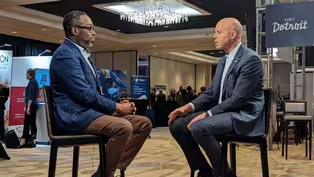
New study finds Black women at greater risk of heart disease
Clip: Season 52 Episode 8 | 9m 39sVideo has Closed Captions
Dr. Brittany Fuller discusses Black women’s heart health during American Heart Month.
New data from the medical team at EHproject show African American women are at a greater risk for heart disease than their white counterparts. For American Heart Month, Henry Ford Health Cardiologist Dr. Brittany Fuller talks about the high rate of heart disease among Black women. Plus, she provides some helpful advice on what women can do to reduce their risk factors.
Problems playing video? | Closed Captioning Feedback
Problems playing video? | Closed Captioning Feedback
American Black Journal is a local public television program presented by Detroit PBS

New study finds Black women at greater risk of heart disease
Clip: Season 52 Episode 8 | 9m 39sVideo has Closed Captions
New data from the medical team at EHproject show African American women are at a greater risk for heart disease than their white counterparts. For American Heart Month, Henry Ford Health Cardiologist Dr. Brittany Fuller talks about the high rate of heart disease among Black women. Plus, she provides some helpful advice on what women can do to reduce their risk factors.
Problems playing video? | Closed Captioning Feedback
How to Watch American Black Journal
American Black Journal is available to stream on pbs.org and the free PBS App, available on iPhone, Apple TV, Android TV, Android smartphones, Amazon Fire TV, Amazon Fire Tablet, Roku, Samsung Smart TV, and Vizio.
Providing Support for PBS.org
Learn Moreabout PBS online sponsorshipFebruary is American Heart Month, and that's a time to focus on improving your heart health.
This is especially important for African-American women.
According to data gathered by the EHProject, heart disease affects more than 47% of Black women.
They also have higher rates of things like hypertension, coronary artery disease, stroke, and heart failure than women in other ethnic groups in our country.
I spoke with cardiologist Dr. Brittany Fuller from the Henry Ford Health System about how Black women can lower their risk for heart disease.
Dr. Brittany Fuller, welcome to "American Black Journal."
- Thank you.
Thank you for having me.
- So I don't think it's much of a surprise to many people that African-American women suffer more from heart disease and its attendant complications than other people do.
But there is something about the dramatic way in which this is affecting Black women more that I think caught me by a bit of a surprise.
So I wanna start with you talking about just the numbers here and how acute this difference is between African-American women and others in our population.
- So unfortunately, and it's unfortunate across the board, not just even heart health, that women, particularly women of color, African-American women are dying at a much higher rate.
There's a lot of different reasons that you can say that that's, you know, different theories that we can hypothesize why this is happening.
But I think one of the biggest things is that women, we tend to take care of everyone else and we don't take care of ourselves.
And so we ignore our symptoms and then unfortunately, when we finally do come out and say, "I'm feeling this way," women, particularly Black women, are ignored.
- I wanna come back to some of the causes a little later.
But I wanna talk upfront about the things that you think women can do and women's families can do to try to reduce this disparity.
And I say families because I think for all of us, it's helpful and maybe even necessary that the people closest to us are as invested in our health as we are.
- So that can hit a multitude of different things from diet to everyone getting on the same page as mom, sister, cousins are trying to work on eating more vegetables, eating more lean protein, cutting out processed foods, not throwing that temptation out there.
And even some of the biases going into family functions when you start to get in shape and lose weight and the family says, "Oh, you look too skinny," or, "Oh, you don't want these ham hocks."
Like it's supporting women in their journey of getting healthy.
So that's something that families can do, just simply be supportive and say, "Hey, I see that you're getting healthy.
I'm gonna join you on that journey, or I'm at least going to support you."
And then also, because women tend to, again, ignore themselves, if you see something is off, if you see that when they're climbing a flight of stairs or you're walking through the mall, that they're short of breath because women tend to, their symptoms, they may not have that crushing chest pain.
They may just become profoundly short of breath or fatigued.
If you see that and say you're walking through the mall and say, "Hey, you just seem a little more short of breath than you normally do."
Bringing it to their attention things that they may not even realize themselves because they're just slowing down and they just may not even realize that.
So just kind of paying attention to that too and helping them out and just bringing it to their attention, maybe you should see a doctor.
- Yeah, so beyond diet, exercise, and general healthy habits, what else do you say that women can be doing to minimize this discrepancy?
- So I'm a strong proponent of the fact that your mind and body are all one.
So taking 30 minutes a day for just you, whether that's meditation, whether that's prayer, whether that's shutting off all of your social media, your phones, disconnecting from the world, and just spending that time with yourself regardless of what you do.
You can pray, you can meditate, you can do whatever you want, but just choosing that 30 minutes for you, because stress hormones, I always tell my patients, stress hormones are great when you're running from a bear, not so much in day to day life.
So if you can kind of find that mind-body connection, cut off the world for 30 minutes, and sometimes it's hard, sometimes it requires getting up 30 minutes early in the morning or after your kids are in bed, 30 minutes before you go to bed, finding that time for you and just saying that's my me time.
For me, I exercise, I find that 30 minutes for myself to say I'm gonna spend 30 minutes on the treadmill, that's my time, and I carve it out.
But finding that that mind-body connection is important.
- So I wanna go back now to kind of the causes and the context for all of this.
Of course, there's a history of unequal treatment for African-Americans, and especially for African-American women, that no doubt contributes to all of these things.
But one of the other things that I want to kind of focus on is this dynamic where when women do speak up, go to the doctor, speak up and say, "Hey, this doesn't feel right," or "This seems like it's a problem," they often are not believed or listened to.
And I wanna talk about what we do about that.
I mean, you, I think being in the position you're in, is part of the solution, but there there's gotta be other things that we should be thinking about to just change the system and the way it responds to African-American women.
- And I do think that that's happening.
think we're a very, very long way away from it being equal.
I do think there are a lot of things in play right now that, you know, making sure that people have the proper training, that everyone is not the same, symptoms are not the same.
I think we're recognizing more that women and women specifically regardless of race, color, they have different symptoms, so they can have the same disease as the men, but may not present the same way.
So I think that's becoming more mainstream, that, again, women may have more shortness of breath as opposed to chest pain or their chest pain is different.
But I always empower patients and I get a lot of these patients in my clinic for obvious reasons that they wanna see an African-American cardiologist, but I always empower people to, if you don't get the answer, you're not settled in the answer that's been given to you, keep looking.
Don't just sit down and say, "It's okay, I'm fine."
You know your body better than we will ever know it because you've been with it for your entire life.
If you're not getting the answer that you want, keep looking.
And keep going and going to different doctors, different hospital systems, someone will listen to you.
It's unfortunate that we have to do that, but you have to.
- Yeah, but that requires, I think, a certain confidence and a certain comfort with the medical system that I also think is a hurdle for a lot of African-Americans.
I mean, we still have challenges getting access to healthcare for people.
And then when they do, making sure that they can kind of take control of that and speak up and decide who they'll see and make sure they get the care that they want.
- 100%, but I also, in that same token, I empower you to know your own numbers.
So getting everyone, I always empower patients, especially when I go out and do like community talks at churches and just community organizations and health fairs, know your numbers.
Get a blood pressure cuff from a drug store, write down some blood pressure numbers.
Know how to check your blood pressure when you get lab work because, you know, when you go for just a routine physical, knowing your A1C, knowing your LDL, knowing those numbers, because the more information you have, you can go out there and actually find the doctors that you need.
But without knowing that stuff, without having that information, you're kind of powerless.
So the more you have, the more you can present and say, "Hey, my blood pressure consistently at home is 140 over 80.
This is abnormal."
I would hate to say that a doctor would turn someone away and say "That's not true" if you're sitting there with a log in their face.
So, yes, there's some things, and I know that different health systems, especially here at Henry Ford, we do a lot of training and implicit bias training that I think is helping from the physician side, but we also have to empower patients as well.
Attention turns to Detroit as the NFL Draft Approaches
Video has Closed Captions
Clip: S52 Ep8 | 6m 39s | Visit Detroit CEO Claude Molinari shares the city’s plans for hosting the 2024 NFL Draft. (6m 39s)
The Carr Center, Bedrock host Black History Month exhibit
Video has Closed Captions
Clip: S52 Ep8 | 7m 49s | The “Celebrating Black Arts” exhibit is on display in Detroit for Black History Month. (7m 49s)
Providing Support for PBS.org
Learn Moreabout PBS online sponsorship
- News and Public Affairs

Top journalists deliver compelling original analysis of the hour's headlines.

- News and Public Affairs

FRONTLINE is investigative journalism that questions, explains and changes our world.












Support for PBS provided by:
American Black Journal is a local public television program presented by Detroit PBS

